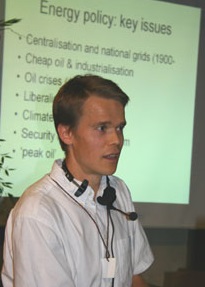How can public controversies surrounding major nuclear projects improve their appraisal?
How can public controversies surrounding major nuclear projects improve their appraisal?
This is the central question of the research project that Markku Lehtonen recently started at UPF, supervised by professor Albert Presas i Puig and funded by a Marie Curie grant.

The term “megaproject pathologies” is coined to denote the cost overruns, delays and failure to provide the promised benefits to society that frequently characterise large and complex industrial projects such as motorways, tunnels, airports, bridges, railways, ports, hydroelectric dams, nuclear power plants and radioactive waste repositories.
Markku Lehtonen is the principal investigator of the project “The technopolitics of nuclear megaproject pathologies, economic controversies and varieties of socioeconomic appraisal” (TENUMECA), which he conducts at the Department of Humanities of UPF between 1 February 2019 and 31 January 2021, thanks to a 2017 Marie Sklodowska Curie Individual Fellowship grant, funded by the Horizon 2020 programme of the European Commission.
The project will examine the historical and contemporary experience of megaprojects in the nuclear sector in Finland, France, Spain, the UK and the OECD Nuclear Energy Agency.
Supervised by Albert Presas i Puig, professor with the Department of Humanities at UPF, Markku examines historical and contemporary experience in nuclear-sector megaprojects in five different political and institutional contexts: Finland, France, Spain, the UK, and the OECD Nuclear Energy Agency.
Virtues of public controversies
“Due to the pervasive uncertainties involved, the significant social and environmental impacts, and the exceptionally high economic and political stakes at play, megaprojects are highly controversial and often lead to public opposition. Various types of expertise – including that of active citizens – play a central role in these conflicts and disputes”, Markku Lehtonen notes.
“Focusing on the role of the economy and economists, TENUMECA explores how public debate can contribute to better appraisal of mega-scale projects. This requires broad perspective that covers the interaction between various types of appraisal: institutionalised forms of assessment and evaluation, social engagement and mobilisation, and public debate”, Markku Lehtonen argues.
According to the researcher, the policy relevance of TENUMECA stems from its ability to help improve the interaction between the various types of appraisal and amongst the stakeholders involved. In particular, it can help to identify ways in which public controversies can strengthen megaproject appraisal.
Evolving societal values, problem definitions and technopolitical culture as key challenges for appraisal
Markku Lehtonen considers that in judging the performance of megaprojects, there is a need to go beyond the conventional “iron triangle” criteria of costs, timetable, and predefined project objectives. “Firstly, because not all megaprojects fail, even according to these narrow criteria. Secondly, because megaprojects always have positive and negative, unforeseen and unintended consequences, which an “iron triangle” assessments tend to miss". He adds: "Importantly, since social preferences and objectives evolve alongside the long processes of planning and implementation of major projects, the criteria for project performance should change accordingly”.
Also, it should be borne in mind that the processes whereby certain definitions of problems and solutions come to prevail over others are crucial to understanding controversy, appraisal and decision-making.
Finally, according to the researcher, “technology and politics interact in the planning and implementation of a megaproject in a specific manner, within a given historically shaped political and institutional setting or technopolitical culture”.
To analyse the trajectories of selected controversies nationally (Finland, France, Spain and the UK) and internationally (the OECD Nuclear Energy Agency, NEA), the project employs methods of document and media analysis, and stakeholder interviews. The analysis contributes to better understanding of the technopolitical culture specific to each case.
Expert in energy and environmental policies
Markku Lehtonen, PhD in Environmental Economics from the University of Versailles Saint-Quentin-en-Yvelines (2005), is specialist in environmental and energy policies, with special emphasis on nuclear power, radioactive waste management and the role of experts in decision-making.

Associated throughout his career with institutions such as the University of Sussex, the École des Hautes Etudes en Sciences Sociales, Paris, and the Université Paris-Est Marne-la-Vallée, he has been one of the researchers of the European project HoNESt (2015-2019), which has just come to an end.
HoNESt analysed the history of the relationship between nuclear power and society in Europe, and was coordinated by professor Albert Presas i Puig, the supervisor of Markku Lehtonen in this new Marie Curie project.
